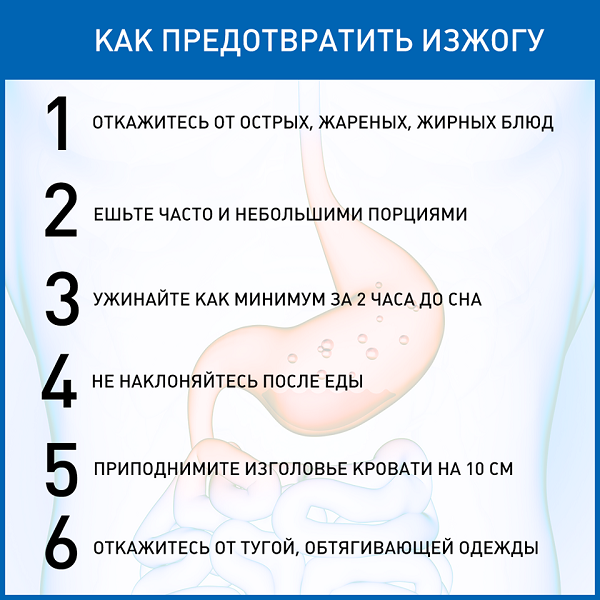Hormonal changes that the body undergoes during pregnancy are the root cause of heartburn. In early pregnancy, the ovaries and then the placenta produce the hormone progesterone, one of the main functions of which is to relax the smooth muscles of the body, including the muscles of the uterus. Progesterone acts in a similar way on other smooth muscles of our body, for example, the muscles of the esophagus, stomach, intestines. Progesterone also has a relaxing effect on the sphincters (circular muscles), whose main task is to separate the different organs of the gastrointestinal system from each other. Relaxation of the esophageal-gastric sphincter leads to the fact that in pregnant women its lumen is open, and hydrochloric acid, which is produced by the stomach, can be thrown into the esophagus, which causes an unpleasant sensation of pain and burning – heartburn.
Another cause of heartburn in pregnant women is a weakening of motility – the undulating movement of the gastrointestinal tract, slowing down the digestion of food. Food travels more slowly through the digestive tract, lingering in the stomach. Heartburn in pregnant women is also provoked by the large size of the uterus, which increases intra-abdominal pressure and increases pressure on all internal organs of the pregnant woman, including the stomach and intestines. The stomach changes its position during pregnancy, is pushed up and to the side by the uterus – all these factors also contribute to impaired motility of the esophagus, stomach and intestines and create conditions for heartburn.
Heartburn can begin at any stage of pregnancy, but it is most common in the second and third trimesters. As a rule, discomfort occurs after 24 weeks, when the uterus rises above the navel, and becomes especially severe after 30 weeks. A woman may have especially intense heartburn if she had an increased acidity of gastric juice before pregnancy.

To avoid heartburn during pregnancy, first of all, you need to review your menu and exclude fatty, fried, spicy, salty foods from it, you need to give up coffee and carbonated drinks. Include cereals, dairy products, low-fat meats and mashed vegetables in the diet. It is advisable to eat frequently and in small portions every 1.5-2 hours. Spend more time on food, remember that you need to chew your food thoroughly so that it is digested correctly. Drink water between meals, not during meals. After a meal, it is not recommended to sit down or go to bed, but to take a walk for a while (about 30-40 minutes). Try to avoid sudden body bends after eating. Do not overeat at night, the last meal is desirable 2-3 hours before bedtime. Don't forget to put an extra pillow under your head, sometimes it helps to cope with heartburn. And if heartburn does appear, you need to try to reduce it.
When the first signs of heartburn appear, you can drink a small amount of alkaline mineral water without gas or take a few sips of low-fat milk. You should drink it in small sips. Jelly works well. They envelop the esophagus and thus reduce the burning sensation. Antacids containing sodium bicarbonate, calcium carbonate, preparations containing magnesium, and other substances are the safest in the treatment of heartburn in pregnant women. Antacids neutralize the acid of the gastric juice, are not absorbed into the blood and cannot affect the developing fetus. Caution should be exercised only with antacids that contain aluminum, because of the theoretical risk of aluminum ions being absorbed into the body of a pregnant woman and penetrating into fetal tissues. The effect of medicinal herbs on a pregnant woman and fetus, their effectiveness, and most importantly, their safety have not been sufficiently studied, so it is better to avoid using herbal remedies for this purpose during pregnancy. Many herbs have a relaxing effect on the smooth muscles of the gastrointestinal tract and thus, on the contrary, can provoke attacks of heartburn. Some women benefit from unroasted hazelnuts or almonds. You need to chew a few kernels to a mushy state, and then swallow. Reduces the acidity of the stomach and milk, which is a natural antacid. It is recommended to drink during the day in small portions.
Despite all the unpleasant sensations of heartburn in pregnant women, this condition does not affect the health of the fetus in any way. But if heartburn is often a normal, physiological phenomenon during pregnancy, then regular heartburn outside of pregnancy is a manifestation of the disease and a reason to consult a doctor.
In the classroom EMC Mom Schools you can ask any questions about pregnancy and childbirth to our experienced specialists.
Was this information helpful?
Questions and answers
Ask a Question







.webp)


.webp)

.webp)

.webp)
